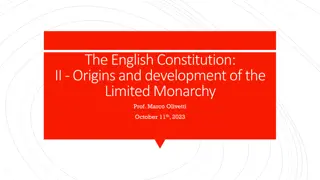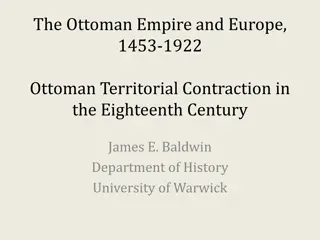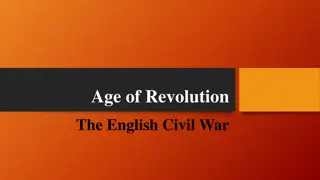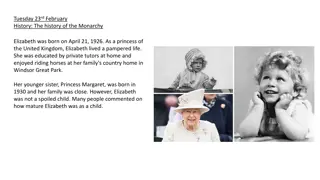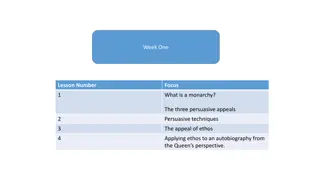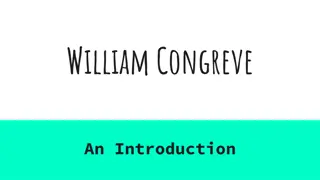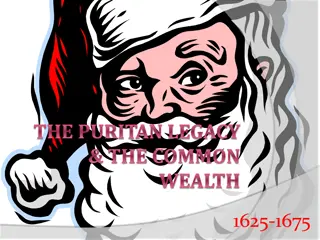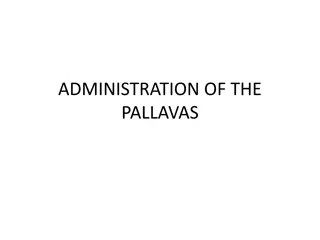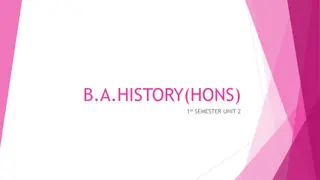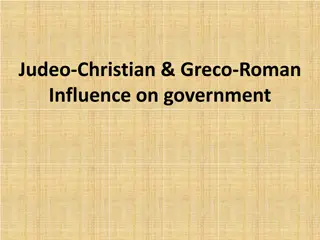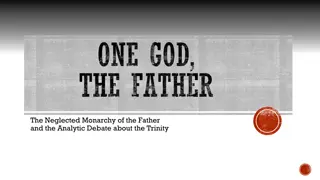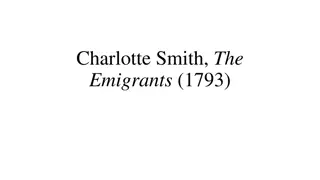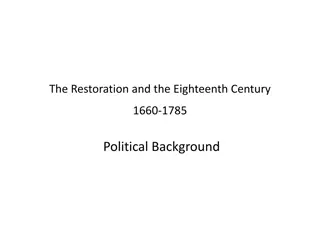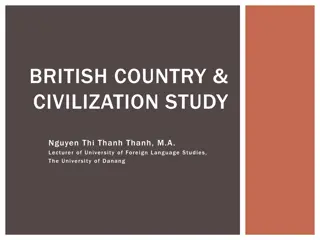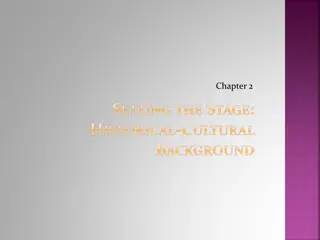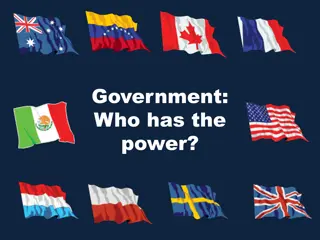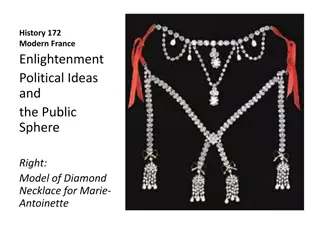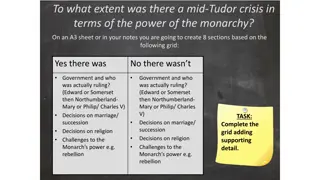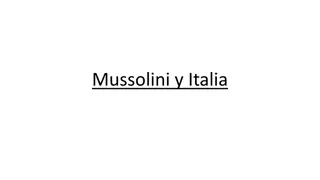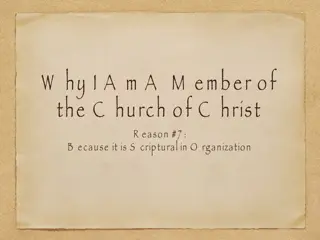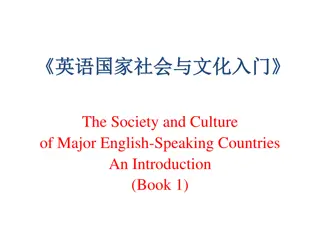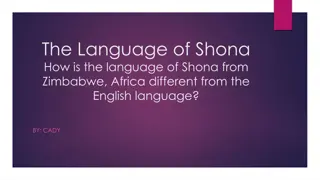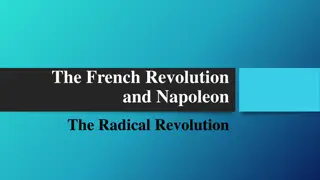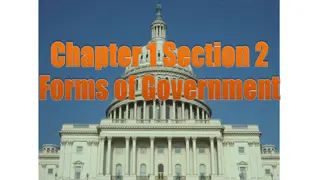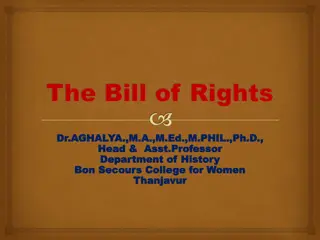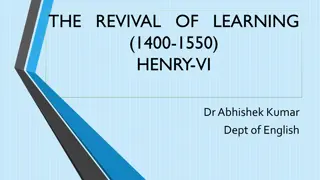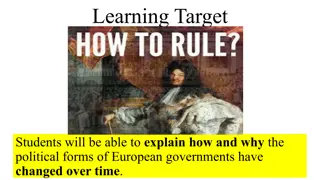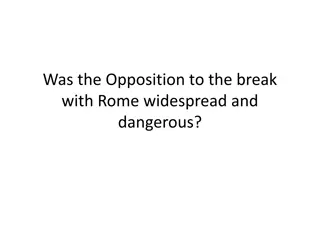Cromwell in Ireland
English authority in Ireland faced challenges after the rebellion of 1641. Cromwell was appointed to crush unrest, landing near Dublin with 12,000 men. Concerns of Parliament included the threat of Catholicism and the use of Ireland against the monarchy. Criticisms arose over Cromwell's brutal campa
0 views • 13 slides
Evolution of Limited Monarchy in English Constitution
The development of limited monarchy in the English Constitution is traced from Anglo-Saxon Britain through the introduction of feudalism. This system of governance established a complex relationship between the king, lords, and vassals, leading to the formation of the King's Council and the origins
0 views • 19 slides
Ottoman Empire Territorial Contraction in the 18th Century
Ottoman Empire faced agricultural and fiscal crises in the 17th century, leading to internal rebellions. However, by the mid-17th century, the empire had recovered and experienced further expansion, albeit at a slower rate compared to the previous century. In the 18th century, the Ottomans suffered
2 views • 12 slides
Evolution of English Literature: From Old English to Beowulf
The English language, evolving over 1,400 years, transitioned from Old English to Middle English with works like Beowulf standing as a pinnacle of Old English literature. The epic poem tells the tale of Beowulf's heroic feats in pagan Scandinavia, showcasing elements of alliteration, a key literary
0 views • 46 slides
The English Civil War and the Rise of the Stuart Dynasty
The English Civil War marked the end of the Tudor dynasty and the rise of the Stuart Dynasty in England. It was a time of conflict between the monarchy and Parliament, with issues revolving around divine right, religion, and political power. Leaders like James I and Charles I faced opposition from P
0 views • 13 slides
The Fascinating History of Queen Elizabeth II and the British Monarchy
Princess Elizabeth's journey from a pampered princess to a mature and resilient queen, overcoming challenges during World War II and ultimately becoming the longest-reigning British monarch in history, with significant events like her marriage to Prince Philip and her coronation in 1953 highlighted.
2 views • 5 slides
Understanding Monarchy: A Study in Persuasive Appeals
Introduction to the concept of monarchy as a form of government and its various manifestations, exploring persuasive appeals and the application of ethos through the perspective of a queen. The content delves into the role of a monarchy in modern society and encourages critical analysis through tran
10 views • 18 slides
The Influence of William Congreve on Restoration Comedy
William Congreve, an English playwright and poet of the Restoration period, is known for his clever and satirical dialogue that influenced the comedy of manners style. The Restoration period marked the end of Cromwell's Commonwealth and the return of monarchy with Charles II. Comedy of manners refle
0 views • 10 slides
The Puritan Legacy & The Commonwealth 1625-1675: A Historical Overview
The era between 1625-1675 is known as The Puritan Legacy & The Commonwealth, characterized by a Puritan movement seeking moral and political reform. This period saw conflict, the rise of Puritan standards, beheading of Charles I, and the establishment of the Commonwealth under Cromwell. The Puritans
2 views • 21 slides
Importance of Teaching English at Different Education Levels
English language holds a significant position in the educational system and national life of India. This presentation by Dr. A. Mary Delphine highlights the aims and objectives of teaching English, emphasizing its importance in India and the modern world. The objectives include understanding the rat
1 views • 32 slides
Administration of the Pallavas: Organized Governance in Ancient Tamil Country
The Pallava kings established a well-organized administration in the Tamil Country, mirroring the Mauryan system. Administrative units like Mandalam, Kottam, Nadu, and Ur were pivotal in governing the vast Pallava Empire. The monarchy was led by the king, who claimed divine origin, with efficient Co
0 views • 8 slides
Rise of Janapadas and Mahajanapadas in Vedic India
The rise of Janapadas and Mahajanapadas marked a significant transition in the political landscape of Vedic India. Janapadas, major kingdoms of that era, evolved into more powerful Mahajanapadas through territorial expansion and urbanization. The shift from tribal polities to territorial states led
0 views • 9 slides
Influences and Views on Government: Judeo-Christian and Greco-Roman Perspectives
Explore the influences of Judeo-Christian and Greco-Roman traditions on government systems, including forms of government such as monarchy, democracy, and republic, along with views on citizen participation, natural laws, and legal principles. Delve into how concepts from Ancient Greece and Rome sha
0 views • 24 slides
Analyzing the Neglected Monarchy of the Father in Trinitarian Debate
Exploring the Monarchy of the Father doctrine and its implications on the Trinitarian debate, this analysis delves into historical context, objections, and influential alternatives like Biblical Unitarianism, shedding light on how reevaluating traditional definitions can reshape theological discussi
0 views • 67 slides
The Emigrants (1793) - Historical Context and Events
Set during the turbulent times of the French Revolution, "The Emigrants" by Charlotte Smith captures the political upheaval and societal changes in France during 1792 and 1793. The story unfolds against a backdrop of revolutionary events such as the execution of Louis XVI, France's declaration of wa
1 views • 23 slides
Understanding the British Governmental System and Monarchy
Explore the British governmental system and monarchy with insights into the House of Parliament, House of Lords, House of Commons, Buckingham Palace, and the Royal Flag. Discover the roles and functions of key institutions in the UK's political framework.
0 views • 13 slides
England in the Restoration and Eighteenth Century: Political Evolution and Social Transition
Following years of civil wars and revolution, England saw significant political shifts from the Restoration period in the 1660s to the Eighteenth Century. The monarchy was restored, leading to the emergence of Whig and Tory political factions, battles for religious dominance, and the growth of Briti
2 views • 14 slides
British Country & Civilization Study: Government and Constitution Overview
The British Country & Civilization Study covers various aspects of the United Kingdom, including its government structure, constitution, history, education, and holidays. The UK is a parliamentary democracy with a constitutional monarchy, where the relationship between the State and the people relie
1 views • 41 slides
Historical and Cultural Context in Biblical Hermeneutics
Understanding the historical and cultural background is vital for interpreting biblical texts accurately. This includes exploring the relationship between history and literature, studying chronology, patriarchal periods, and significant events like the Exodus and United Monarchy. By delving into the
0 views • 48 slides
Understanding Different Forms of Government
An institution known as government establishes and enforces rules for a group of people. This institution must possess sovereignty, legitimacy, and jurisdiction. Various forms of government exist, such as dictatorship, absolute monarchy, and constitutional monarchy, each with distinct characteristic
0 views • 12 slides
Enlightenment Political Ideas in Modern France
The Enlightenment era in Modern France brought forth significant political ideas and discussions, including Thomas Hobbes' concept of social contract and Rousseau's emphasis on collective sovereignty. Montesquieu advocated for checks-and-balances in government, while Voltaire promoted enlightened ab
0 views • 21 slides
Australia - Overview of Geography, Government, and Environmental Challenges
Australia, officially known as the Commonwealth of Australia, is a federal parliamentary state with a constitutional monarchy. The country has a unique landscape, facing challenges such as water management due to its dry climate. Climate change impacts are also a significant concern, making Australi
0 views • 24 slides
Examination of the Mid-Tudor Crisis: Power Struggles and Challenges to Monarchy
The mid-Tudor era witnessed a crisis in the power of the monarchy, as evident through issues of government authority, decisions on marriage and succession, religious policy, and challenges to royal power. The complexities of ruling under Edward VI, Mary I, and their advisors, along with crucial even
0 views • 16 slides
Understanding Thomas Hobbes' Leviathan: State of Nature, Natural Laws, and Commonwealth
Thomas Hobbes explores the state of nature, natural laws, and the formation of the commonwealth in his work Leviathan. He discusses the equality of men, causes of conflict in the state of nature, and the transition out of this chaotic state towards civil society under a monarchy. According to Hobbes
0 views • 15 slides
Rise of Mussolini in Italy and Weaknesses of the Liberal Monarchy
The historical timeline of Italy before 1919 led to Mussolini's rise to power through various events such as his involvement with the Italian Socialist Party and the formation of the Fascio di Combattimento. Italy's Liberal Monarchy faced weaknesses, including political divisions between progressive
0 views • 35 slides
Understanding the Scriptural Organization of the Church of Christ
The Church of Christ emphasizes its scriptural organization, rejecting denominational forms of government and upholding the monarchy of Christ's church. Through biblical authority and church autonomy, each congregation maintains its independence while sharing a common mission. This arrangement refle
0 views • 45 slides
The Government and Monarchy of the United Kingdom: A Historical Overview
Explore the rich history of the United Kingdom's government and monarchy, from the ancient institution of the Monarchy and the role of the Prime Minister to significant events like Magna Carta and the Civil War. Discover the development of Parliament, the birth of the Prime Minister, the roles of th
0 views • 28 slides
Contrasting Shona and English Languages in Zimbabwe
The language of Shona in Zimbabwe, Africa, differs from English in various aspects such as script symbols, alphabet, official usage, borrowing of words, and number of speakers. Shona has a script with 35 symbols, while English has a 26-letter alphabet. English is the official language of the USA, wh
0 views • 5 slides
Influence of Indian English in "The Jewel in the Crown" by Rochana Jayasinghe
Indian English plays a significant role in the Indian subcontinent with 200 to 333 million English speakers. India is a key player in the English language landscape, publishing more books in English than any other language. The British Raj from 1858 to 1947 shaped the prominence of English in India,
0 views • 18 slides
The Radical Phase of the French Revolution: Abolishing the Monarchy
The French Revolution entered its Radical Phase in 1793, marked by violent events such as the abolition of the monarchy, execution of King Louis XVI, establishment of the French Republic, and the subsequent Reign of Terror. Tensions rose as war broke out with various countries, leading to internal c
0 views • 19 slides
GCSE English Language and Literature Overview
GCSE English Language and Literature subjects are led by Mrs. A. Baker and Mr. Doodson. English Language is examined by OCR, while English Literature is examined by Edexcel. Both subjects have two examination papers worth 100% of the grade. English Language papers focus on reading and writing skills
0 views • 14 slides
Overview of Different Types of Governments and Their Classifications
Governments vary in structure and features, with classifications based on key characteristics like the concentration of power, participation in governance, and the relationship between branches. This overview covers various government types such as autocracy, democracy, oligarchy, and monarchy, high
0 views • 15 slides
The English Bill of Rights: Definition and Impact
The 1689 English Bill of Rights was a pivotal British law passed after the Glorious Revolution of 1688. It outlined the rights and liberties of people, limiting the monarchy's power and establishing a constitutional monarchy in Great Britain. The Bill influenced constitutional developments in North
0 views • 10 slides
Choosing the Right English Course for Your HSC: Advanced, Standard, or Studies?
When preparing for the HSC, selecting the appropriate English course is crucial as it is compulsory. Options include Advanced English, Standard English, and English Studies, each offering unique benefits. Advanced English challenges students with higher-order thinking skills, while Standard English
0 views • 25 slides
The Revival of Learning and Turmoil in English Monarchy (1400-1485)
Henry VI was overshadowed by powerful nobles, leading to England's destructive Wars of Roses. His reign ended with losses to the French and was followed by the dreadful rule of Richard III, marking the close of the Middle Ages in England.
0 views • 5 slides
Political Evolution of Nepal: From Monarchy to Republic
Explore the political history of Nepal from the days of monarchy to the establishment of a republic. Learn about the key players, structures, and societal makeup that have shaped the country's journey towards democracy and governance.
0 views • 11 slides
Evolution of European Governments: Historical Changes and Challenges
Explore the transformation of European governments through key events like the English Civil War, Glorious Revolution, struggles in Poland between monarchy and nobility, and characteristics of the Dutch Republic during its Golden Age. Uncover the shifts in political forms as monarchies evolved and r
0 views • 25 slides
The Monarchy in England: From Restoration to Revolution
The content discusses the Restoration of the monarchy in England, the reign of Charles II, the formation of political parties Whigs and Tories, the rise of the Whigs, James II's absolutist aims, and the Glorious Revolution leading to the Bill of Rights in 1689 limiting the monarch's power.
0 views • 8 slides
Understanding Different Forms of Government
Exploring various types of government, from monarchy to democracy, and discussing the roles and structures that define each system. Discover insights into absolute monarchy, constitutional monarchy, and more, shedding light on the diverse ways societies are governed.
0 views • 20 slides
Opposition to the Break with Rome in 16th Century England
The opposition to the break with Rome during the reign of Henry VIII in 16th century England was notable, leading to executions of prominent figures like Sir Thomas More and Bishop John Fisher. Despite some limitation of overt opposition, the English people were deeply connected to the papacy. The s
0 views • 12 slides

